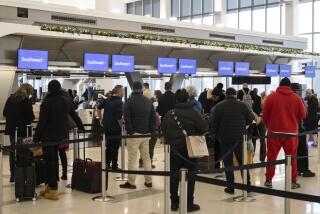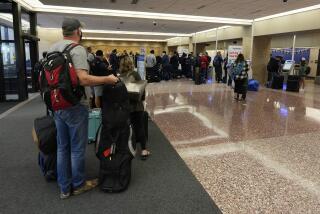AIRLINES : Carriers Likely to Boost Their Liability Caps
- Share via
TORONTO — The world’s airlines are ready to sharply increase the maximum amount paid to passengers in the event of injury or loss of life from the present outdated levels, the International Air Transport Assn. said.
An agreement in principle signed by 67 carriers in Washington last weekend aims to head off large payouts such as the multimillion-dollar awards in the case of the 1988 bombing of Pan Am Flight 107 over Lockerbie, Scotland.
Under the agreement, the international passenger liability limit--the maximum amount airlines can be compelled to pay in the event of injury or loss of life--would rise to about $382,000. The new maximum would probably take effect in 1996.
“There is no doubt about it: The customers want an agreement, the consumers associations around the world have been supporting it very strongly,” Pierre Jeanniot, a former Air Canada president, told a news briefing Monday.
The current liability system for international air travel, which originated with the 1929 Warsaw Convention, is a patchwork of caps, varying by country from $10,000 to $153,000.
Japan accepts no limit for passengers of Japanese airlines. But most countries use a $75,000 limit adopted in 1966.
The proposed maximum applies only to international travel. In many countries, there is no limit on claims arising from domestic accidents.
Even with the outdated international caps, the courts can still award additional damages if they find that willful misconduct by the airline contributed to an accident, IATA officials said. Hence the massive awards from U.S. courts in the bombing of Pan Am Flight 107. The most recent award in that case was $19 million.
By raising the liability cap, the airlines hope to stop the trend to litigate and reduce the industry’s insurance costs. Plaintiffs will be able to get significant compensation more quickly if they do not go to court, said Lorne Clark, the IATA’s chief counsel.
Besides setting a higher basic maximum for all countries, the IATA plan--proposed by the United States--would allow for unlimited compensation for proven damages.
The United States is proposing a $1 to $3 surcharge on all international tickets sold in the United States, to be paid into a fund to cover damages in excess of the $382,000 cap.
The legal text of the draft agreement requires approval of the IATA, which will hold its annual meeting Oct. 29-31 in Kuala Lumpur, Malaysia, Jeanniot said. It would then be up to individual countries to ratify the new cap.
With all major European carriers--among others--strongly supporting it, Clark said, the chances of that happening are good, which will put pressure on other countries to follow.
More to Read
Inside the business of entertainment
The Wide Shot brings you news, analysis and insights on everything from streaming wars to production — and what it all means for the future.
You may occasionally receive promotional content from the Los Angeles Times.










